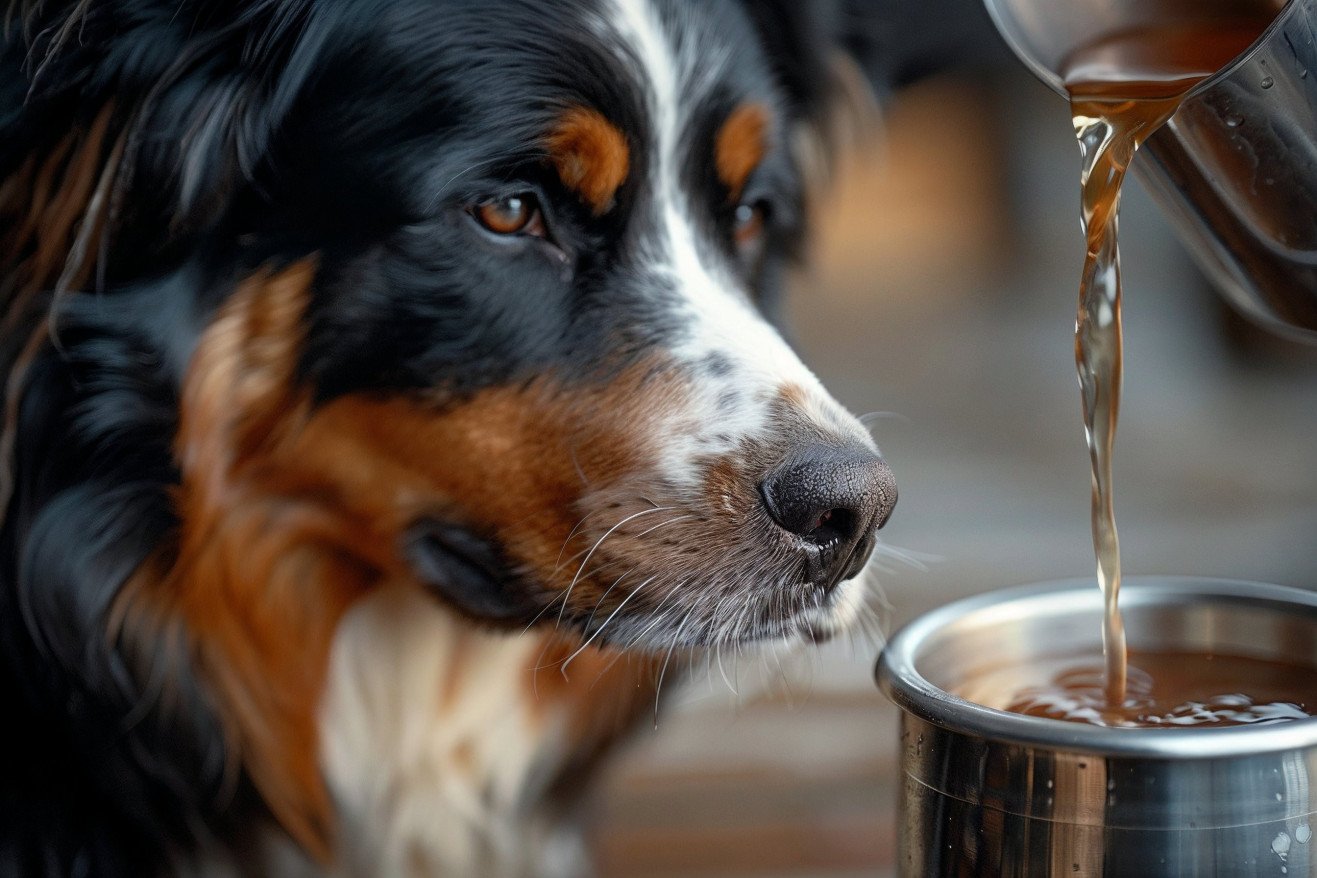Is Bone Broth Good for Dogs? Pros, Cons, and Expert Advice
21 May 2024 • Updated 20 May 2024

Bone broth has become increasingly popular in the health and wellness world, but is it actually good for your dog? Bone broth is packed with nutrients such as protein, collagen, glucosamine, and minerals that can benefit dogs in a number of ways. It can promote joint and gut health, improve skin and coat health, and even support the immune system, making it a healthy treat or meal addition for many dogs.
That said, while there are many benefits to bone broth, it's also important to know exactly what's in that cup before you let your dog lap it up. In this article, we'll explore the latest scientific evidence from pet nutritionists, veterinarians, and food scientists to help you better understand the potential benefits and risks of giving your dog bone broth. We'll also take a look at safe homemade bone broth recipes, store-bought options, potential hazards to watch out for, and the best ways to add this popular superfood to your dog's diet.
Is bone broth good for dogs?
How to Make Bone Broth for Dogs
Making bone broth at home is an easy and affordable way to give your dog a nutrient-rich snack. All you need are high-quality bones, filtered water, and a little apple cider vinegar or lemon juice. Red Dog Blue Kat says that the vinegar is important because it helps to pull the minerals out of the bones as they cook.
When it comes to bones, Dogs Naturally Magazine says that you should opt for joints like chicken feet or beef marrow bones, which are high in gelatin and glucosamine that can help with joint health. Pork ribs and other meaty bones are also good choices. Just make sure you don't use large animal weight-bearing bones as they can splinter.
The process is simple - put the bones in a pot or slow cooker, cover them with water, add the vinegar, and let them simmer for 6-24 hours. Oma's Pride recommends adding vegetables like carrots and celery to the mix to make the broth even more nutritious. Make sure to skim off any foam that rises to the top and let the broth cool before straining out the bones and other solids.
It's important to make sure you're being safe when you're making bone broth. Never give your dog cooked bones as they can splinter and cause problems. Bluebird Provisions also notes that you should never include onions or garlic, which can be toxic to dogs. As long as you're careful with your ingredients, homemade bone broth can be a healthy addition to your dog's diet.
Bone Broth for Dogs: What Are the Benefits?
Bone broth offers a variety of benefits for dogs, including support for joint health and a boost to the immune system. As the Dog Food Advisor notes, bone broth is "a high percentage of collagen which strengthens skin integrity and makes the coat shiny and soft. It also promotes healthy joints, the digestive, and gastrointestinal systems, and the overall immune system."
Meanwhile, the Rover.com blog points out that the glucosamine and chondroitin found in bone broth can help with joint health and arthritis in dogs. It also notes that the gelatin and amino acids in bone broth can support gut health and nutrient absorption.
Bone broth is also hydrating and can even help dogs that are sick or getting older feel more interested in eating, according to the American Kennel Club. The collagen and other nutrients in bone broth can also help support skin and coat health.
In addition to joint and gut health, Darwin's Pet Food notes that bone broth includes important minerals and amino acids that can help with liver detoxification and immune support. Thanks to its many nutrients, bone broth can be considered a superfood for dogs.
How Much Bone Broth Should Dogs Have?
Primalvore recommends a standard serving size of 1 ounce of bone broth for every 10 pounds of a dog's body weight. This means that a 100-pound dog would be served 10 ounces of bone broth. The Primalvore serving size is one serving per day, but pet parents can increase to two servings after monitoring their dog's digestive system.
Open Farm advises pet parents to add at least two tablespoons of bone broth per 10 pounds of body weight to their dog's daily meals. This can be given as a topper or a supplement. The serving size can be adjusted based on a dog's age, health, and activity levels.
It's important to introduce bone broth to your dog's diet slowly and to monitor for any signs of an upset stomach, such as diarrhea or vomiting. Animal Behavior College also notes that bone broth should not be used as a complete meal replacement but as a supplement to a balanced diet. Feeding bone broth in moderation is the best way to ensure that your dog reaps all of its benefits.
Potential Risks and Side Effects of Bone Broth for Dogs
Although bone broth can be a healthy addition to your dog's diet, there are some potential risks and side effects to keep in mind as well. According to Independence Veterinary Clinic, introducing new foods can sometimes lead to digestive upset, such as diarrhea or vomiting, especially when first introducing bone broth.
There is also a risk of allergic reactions, especially in dogs with food allergies or sensitivities. Bluebird Provisions advises pet parents to read the ingredient list carefully, as some bone broth recipes may include onions or garlic, which are toxic to dogs. It's also important to be mindful of the sodium content in bone broth, especially if you're using store-bought products.
In addition, FirstVet explains that cooked bones can splinter and cause internal damage if swallowed. Bone broth should never be used as a complete meal replacement, and St Paul Dog Daycare explains that it should be avoided in dogs with certain health issues, such as kidney disease or mast cell disease.
Store-Bought vs. Homemade Bone Broth: Pros and Cons
While making bone broth at home is often cheaper and more customizable, store-bought bone broth products are more convenient and save time. Per Keep the Tail Wagging, making your own bone broth ensures you know exactly what's in it and that you're using high-quality bones, which can make for a more nutrient-rich broth that's tailored to your dog's specific needs. On the other hand, The Wildest points out that store-bought options like Honest Kitchen's Bone Broth can be a more realistic option when you're short on time, even if they're more expensive.
If you do opt for store-bought bone broth, it's important to check the ingredients list. Per Animal Behavior College, some store-bought bone broths may contain ingredients like onions or garlic that are toxic to dogs. Honest Kitchen and Open Farm are two well-respected brands that make high-quality pet foods and offer bone broth for dogs.
In the end, the choice between homemade and store-bought bone broth will come down to your personal situation and preferences. No matter which option you go with, adding this nutritious superfood to your dog's diet may help them experience a number of health benefits.
Conclusion: What to Know About Giving Dogs Bone Broth
Bone broth can be a great way to add some extra nutrients to your dog's diet, and there are a number of potential benefits that come with it. Bone broth is full of essential nutrients like protein, collagen, glucosamine, and important minerals that can help improve joint health, skin and coat health, and the immune system.
That said, it's important to start with small amounts of bone broth and keep an eye out for any digestive upset or allergic reactions. It's also important to remember that bone broth should be used in moderation and not as a complete replacement for a healthy, balanced diet. It's always a good idea to talk to your vet before adding any new supplements, especially if your dog has any underlying health issues.
In general, the evidence shows that bone broth can be a safe and helpful supplement for most dogs when used in the right way. If you're interested in adding a little something extra to your dog's diet, you may want to consider trying homemade or high-quality store-bought bone broth as part of a healthy feeding plan.


